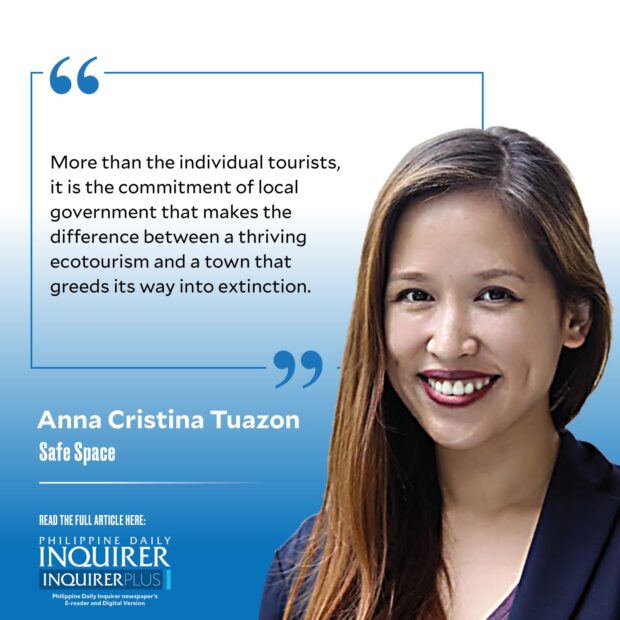Let tourists come

It is Holy Week and for the nondevout this means a rare week of rest. It also means that this is one of the busiest weeks for the tourism industry.
My family has been residents, for many years now, in a town that relies heavily on tourism. It is an interesting vantage point, seeing the ebb and flow of tourists and the accompanying bustle of services that accommodate these weekend warriors.
We have adapted to this cycle, mostly staying in during the weekends and relishing the peace and quiet during the weekdays. I have friends who reside in much more popular destinations such as Baguio and Boracay and I often hear them bemoan the arrival of tourists in their area. Yes, large crowd of tourists come with a cost.
They put enormous pressure on traffic and sewage systems. If not well regulated, they can also do irreversible damage to the environment that attracted them in the first place. I somehow have never developed that NIMBY (“not-in-my-backyard!”) attitude because I have witnessed what it is like when tourists disappear.
When COVID-19 hit, our area—like a lot of other tourist towns—became a ghost town. Due to severe quarantine and movement restrictions, tourism came to a standstill. Since our work could be done remotely, we were not personally affected. Others, however, that relied on tourists renting out their boats and eating from their diners, suffered greatly.
The sea was now silent, undisturbed by tourist activity. This sense of quiet, once longed for, became a source of unease as travel restrictions kept extending. Some people had to move away, in order to look for other sources of income. Granted, it wasn’t only tourism that suffered. Fishing activities were also hampered by quarantine policies. The sea, whether through tourism or fishing, was the source of life for our community.
Tourism helps diversify livelihood, creating jobs where there were none. A strong fishing community remains, as can be appreciated when one wakes up early enough to see the colorful boats head out (and woe to the marketgoer who misses out on today’s catch because they slept in—and by marketgoer, I mean me).
Tourism, however, can provide a safety net for the ever-increasing unpredictability of fishing by creating extra income through the ferrying of touring divers. Dining and accommodations in the area also rely heavily on weekend tourists. Dining has been extremely local here, with a McDonald’s finally popping up just last month (though Jollibee has beat them to it by setting up in a nearby town). Once we had gained awareness of how much tourism matters, we committed to not stopping at the mega-gas stops populating South Luzon Expressway and instead patronize the local goto and lomi shops.
At the same time, tourism is a double-edged sword. The warnings from other towns besotted by tourists resonate whenever we hear news of reefs being damaged and fishes suffocating from oil spills. More than the individual tourists, it is the commitment of local government that makes the difference between a thriving ecotourism and a town that greeds its way into extinction.
The drive to our area, for example, is lined with huge oil refineries. How they are allowed to set up along the Verde Island Passage is beyond my memory. While tourists already pay some form of environmental tax, we have yet to see anyone guarding the sea, ensuring responsible behavior. We have seen boats sneak out trash, the trail of trash debris betraying their actions, without consequence.
Overall, we get to enjoy more balance as compared to other tourist places. Perhaps it is because our area generally lends itself to a relatively niche tourism—adventure divers who are willing to spend and train to experience marine biodiversity firsthand.
The requisite orientation and training for this underwater activity means that they at least have been taught environmental etiquette such as no touching of anything while underwater, lest they destroy corals and disrupt the fragile ecosystem. Thus, we have less incidents of irresponsible tourist behavior, though we have had to bellow out to wayward snorkelers standing on marine sanctuaries, warning them to get off the rocks.
Our beaches are rocky, therefore not appealing to the general masses. It is difficult to traverse the beach by foot, necessitating kayaks and bangkas if you want to enjoy the view of the coastline. Resorts are tucked away, hidden from view unlike the public stretches in Boracay.
Now, whenever I see boats full of divers, I breathe a sigh of relief for the workers that rely on their business. It gets noisy at times, yes, but that, too, is now welcome. That noise is the sound of life bouncing back. It is the sound of folks that no longer need to find another source of income or to have to move to the city to feed their families. We welcome the noise because we know that it is temporary; we will have time for quiet on Mondays. For now, let the tourists come.
——————–
aatuazon@up.edu.ph




















